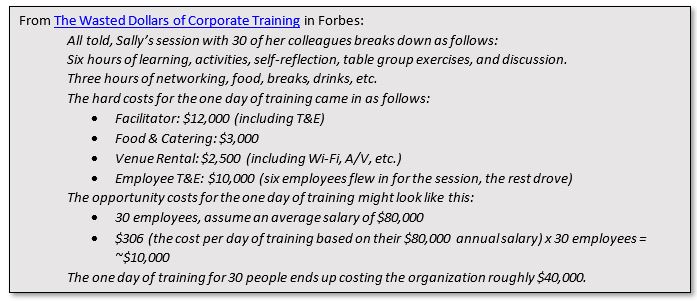Training managers know that training encompasses much more than what happens during the class itself. There is an infrastructure of talent, logistics, training materials, vendor management, and employee engagement that must come together for effective learning to occur. Training Magazine’s Industry Report, a standard for over three decades, reported in 2019 total U.S. training expenditures as $83 billion, including the costs of training staff and vendor services. Both direct and indirect costs should be included when determining the true cost of any corporate training effort so that budgets can be determined and the ROI of corporate training calculated.
On this page:
- Understanding Types of Costs
- Direct Costs of Corporate Training
- Indirect Costs of Corporate Training
- Breaking Down the Costs of Corporate Training
- Reducing Costs While Keeping Quality
- Teams that Train Together Perform Better Together
- Instructor Travel vs Employee Travel
- Onsite, Online, or Both
- Invest in Training to Save Money

Understanding Types of Costs
 Ever hear a co-worker say, “if we use the internal training team, the class will be free because we don’t pay for anything.”? Yet, if those same co-workers stood in a hallway staring at each other because there was no training room reserved, no instructor to guide the work, no materials to reinforce key points, and no documentation to include for certifications, they may rethink that “it’s all free” concept. Just as you would for a project budget, it is important to know what items, services, expenses, and fees comprise a training solution’s cost so that you can garner support for quality training for your business. Internal or external, onsite or virtual, all training has a cost.
Ever hear a co-worker say, “if we use the internal training team, the class will be free because we don’t pay for anything.”? Yet, if those same co-workers stood in a hallway staring at each other because there was no training room reserved, no instructor to guide the work, no materials to reinforce key points, and no documentation to include for certifications, they may rethink that “it’s all free” concept. Just as you would for a project budget, it is important to know what items, services, expenses, and fees comprise a training solution’s cost so that you can garner support for quality training for your business. Internal or external, onsite or virtual, all training has a cost.
At a base level, there are direct and indirect costs. Direct are those costs that have a 1:1 connection to the specific service or good; they include software, equipment, raw materials, and labor that is specific to the product, department, or project. Indirect costs include generalized costs for the business which are needed to create the service or good; they include overhead costs and are sometimes referred to as the “real” costs of doing business.
Direct Costs of Corporate Training
 When you are putting together a training plan, it is easy to look up a vendor and just quote the price from the website, for example, $599/person and for a class of 15, that will give you a direct cost estimate of ($599 x 15 = $8,985). That is one item in your potential list of direct costs for training. Other costs of software, equipment, materials, and labor could include but are not limited to:
When you are putting together a training plan, it is easy to look up a vendor and just quote the price from the website, for example, $599/person and for a class of 15, that will give you a direct cost estimate of ($599 x 15 = $8,985). That is one item in your potential list of direct costs for training. Other costs of software, equipment, materials, and labor could include but are not limited to:
- Room Set up / Reservation Fees
- Software Licenses or Technology Fees
- Vendor Travel
- Vendor Training / Fees
- Training Materials with Shipping Fees
- Testing Fees (if applicable) for each Participant
- Catering / Snacks / Beverages
- Vendor and Participant Parking
- Employee Participants
- Employee Coverage for Employees Attending Class
- Employee Participants Travel costs
Indirect Costs of Corporate Training
Some costs are in place regardless of whether a training is held. Those indirect costs do connect to the training because, if there was not a training room available or the employees did not already have laptops, there would be costs to provide those things. Some indirect costs are easier to connect to the training while others can be estimated or not fully calculated.
- Employee Administrative Work: Finding and Vetting Vendor, Getting Contract, Scheduling Room/Logistics, Recruiting, Registration, Communications to Learners, LMS Set Up Time
- Wi-Fi / Internet Service
- Building Maintenance and Housekeeping
- Printing of Invoices and Materials
- Employee Computers / Workstations
Breaking Down the Costs of Corporate Training
That vendor training you found for $599/person for a class of 15 ($599 x 15 = $8,985), could in fact cost $45,000 or more when all costs are factored. Depending on if you are working on a training proposal, researching the ROI of a training, or managing a company’s overall training budget, you do not need to capture every possible cost. A former Chief Learning Officer provides a great corporate training cost breakdown in his Forbes’ piece “The Wasted Dollars of Corporate Training”:

Reducing Costs While Keeping Quality
The great news is that understanding the true cost of corporate training enables you to better manage those costs. There are different approaches which can help ensure your employees get the training they need without breaking the overall training budget. Consider these options to manage training costs.
Teams that Train Together Perform Better Together
Obtaining team or group rates can significantly reduce the overall cost per person while increasing the overall business impact of the new skills. You will also have higher engagement and built-in reinforcement of the learning itself.
Instructor Travel vs Employee Travel
Bringing the Instructor on site to deliver the class means your employees do not lose work time or productivity due to travel time. And if there is a flight delay or weather change, your employee remains available for work while the instructor attends to travel challenges. Additionally, you can include limitations to travel fees for the vendor to keep the cost at a fixed rate.
Onsite, Online, or Both
Follow up sessions and coaching can greatly enhance the impact of training. Rather than paying to have the instructor travel back and forth to class sites, use virtual options to provide the follow up to employees. In that way, you support the learning while keeping costs down.
Invest in Training to Save Money
Gallup’s How Millennials Want to Work and Live states that 59% of millennials, 44% of Gen Xers and 41% of baby boomers say opportunities to learn and grow are extremely important to them. That same Gallup report states that 87% of millennials and 69% of non-millennials rate “professional or career growth and development opportunities” as important to them in a job. A well-managed training budget has the potential to save the costs of recruiting, on-boarding, training, and replacement of employees.
Studying for the PMP Exam?
Upcoming PMP Certification Training – Live & Online Classes
| Name | Date | Place |


 New Horizons
New Horizons
 Project Management Academy
Project Management Academy
 Six Sigma Online
Six Sigma Online
 TCM Security
TCM Security
 TRACOM
TRACOM
 Velopi
Velopi
 Watermark Learning
Watermark Learning
 Login
Login




 New Horizons
New Horizons
 Project Management Academy
Project Management Academy
 Velopi
Velopi
 Six Sigma Online
Six Sigma Online
 TCM Security
TCM Security
 TRACOM
TRACOM
 Watermark Learning
Watermark Learning